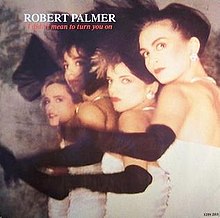
Riptide is the eighth studio album by English singer Robert Palmer, released in November 1985 by Island Records. The album was recorded over a period of three months in 1985 at Compass Point Studios in Nassau, Bahamas. The album peaked at No. 5 on the UK Albums Chart and at No. 8 on the US Billboard 200. It was certified double Platinum in the US by the RIAA in March 1996 and certified Gold in the UK by BPI in August 1986. It features the songs "Addicted to Love", "I Didn't Mean to Turn You On", "Hyperactive", "Discipline of Love", and "Riptide" which were all released as singles. The single "Addicted to Love" was accompanied by an iconic and much-imitated music video, directed by Terence Donovan, in which Palmer is surrounded by a bevy of near-identically clad, heavily made-up female "musicians," either mimicking or mocking the painting style of Patrick Nagel. In September 1986, Palmer performed "Addicted to Love" at the 1986 MTV Video Music Awards in Los Angeles, California. In 1987, he won the Grammy Award for Best Male Rock Vocal Performance for "Addicted to Love". At the 1987 Brit Awards, Palmer received his first nomination for Best British Male.
Cheryl Anne Norton, better known by her stage name Cherrelle, is an American R&B singer and songwriter who gained fame in the mid-1980s. Her signature hits include "I Didn't Mean to Turn You On", "Where Do I Run To", "Everything I Miss at Home", and duets with R&B singer Alexander O'Neal such as "Saturday Love" and "Never Knew Love Like This", as well as "Always" with her cousin Pebbles.

"Didn't I (Blow Your Mind This Time)" is a song by American soul group the Delfonics, co-written by producer Thom Bell and lead singer William Hart. It was released as a single in 1969 on the Philly Groove record label and appeared on their self-titled third album the following year. The song reached number three on the Billboard R&B chart and number ten on the Billboard Hot 100 in 1970. Overseas, the song peaked at number 22 on the UK Singles Chart in and number 81 in Australia. The Delfonics won a Grammy Award for Best R&B Vocal Performance by a Duo or Group for the song in 1971.
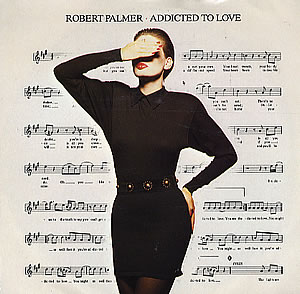
"Addicted to Love" is a song by English rock singer Robert Palmer released in 1986. It is the third song on Palmer's eighth studio album Riptide (1985) and was released as its second single. The single version is a shorter edit of the full-length album version.

"Walk On By" is a song written by Burt Bacharach and Hal David for singer Dionne Warwick in 1963. Warwick's recording of the song peaked at number 6 on the US Billboard Hot 100 and number 1 on the Cash Box Rhythm and Blues Chart In June 1964 and was nominated for a 1965 Grammy Award for the Best Rhythm and Blues Recording.
"Let's Get Together", also known as "Get Together" and "Everybody Get Together", is a song written in the mid-1960s by the American singer-songwriter Chet Powers, from the psychedelic rock band Quicksilver Messenger Service. A hit version by the Youngbloods, included on their 1967 debut album The Youngbloods, peaked at No. 5 on the Billboard Hot 100 in 1969.
"Don't Leave Me This Way" is a song written by Kenneth Gamble, Leon Huff and Cary Gilbert. It was originally released in 1975 by Harold Melvin & the Blue Notes featuring Teddy Pendergrass, an act signed to Gamble & Huff's Philadelphia International label. "Don't Leave Me This Way" was subsequently covered by American singer Thelma Houston in 1976 and British duo the Communards in 1986, with both versions achieving commercial success.
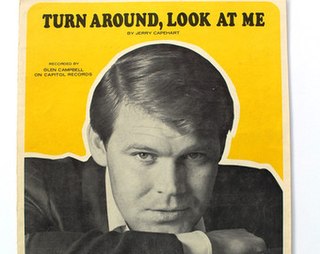
"Turn Around, Look at Me" is a song written by Jerry Capehart and Glen Campbell, though Campbell is not officially credited.
"You're Nobody till Somebody Loves You" is a popular song written by Russ Morgan, Larry Stock, and James Cavanaugh and published in 1944. The song was first recorded by Morgan and was a hit for him in 1946, reaching the No. 14 spot in the charts. The best known version was Dean Martin's, which was released in 1960 and reissued in 1964.
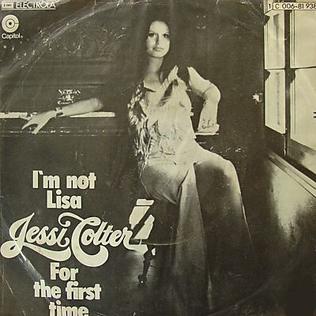
"I'm Not Lisa" is the most successful song by American country music artist Jessi Colter. It was released on January 16, 1975, as the lead single from her album I'm Jessi Colter. The song hit number 1 on the country charts in the US and Canada, and it crossed over to number 4 on the Billboard pop chart. The plaintive love song was Colter's first major hit as a solo artist, following more than ten years of country music performances. The song is Colter's only foray into the pop Top 40, technically giving her a one-hit wonder status despite her multiple country chart hits.

"Straight Outta Compton" is a song by American hip hop group N.W.A. It was released on July 10, 1988 as the lead single from their debut album of the same name. It also appears on N.W.A's Greatest Hits with an extended mix and The Best of N.W.A: The Strength of Street Knowledge. The song samples "Funky Drummer" by James Brown, "You'll Like It Too" by Funkadelic, "West Coast Poplock" by Ronnie Hudson and the Street People, "Get Me Back on Time, Engine No. 9" by Wilson Pickett, "Amen, Brother" by The Winstons, and "One for the Treble" by Davy DMX. It was voted number 19 on About.com's Top 100 Rap Songs, and is ranked number 6 on VH1's 100 Greatest Songs of Hip Hop.

"Bad Case of Loving You " is a 1978 song, written and originally recorded by Moon Martin and sung a year later by Robert Palmer. The song became one of Palmer's definitive hits.

"Saturday Love" is a song performed by American R&B singers Cherrelle and Alexander O'Neal. The song was written and produced by Jimmy Jam & Terry Lewis and was released in October 1985. It peaked at No. 2 on the US R&B chart and became a moderate pop hit peaking at No. 26 on the US Hot 100 in the spring of 1986. It reached No. 6 on the UK Singles Chart, and No. 7 on the Irish Singles Chart. The song appeared on Cherrelle's gold album, High Priority on Tabu Records and included an extended spoken dialogue introduction skit set in a bar.
"Some Guys Have All the Luck" is a song written by Jeff Fortgang. It has been a Top 40 hit on the Billboard Hot 100 twice, as the original by The Persuaders in 1973 reaching No. 39, then as the cover by Rod Stewart in 1984 where it hit No. 10 in the U.S. and No. 32 on the Adult Contemporary chart.

"What You Won't Do for Love" is a song by American singer-songwriter Bobby Caldwell. It was released in September 1978 as the lead single from his eponymous debut album (1978). It was written by Caldwell and Alfons Kettner, and produced by Ann Holloway. The song has been covered and sampled numerous times, including by Tupac Shakur in the posthumous 1998 hit "Do for Love".

"With You I'm Born Again" is a 1979 duet written by Carol Connors and David Shire that originated on the soundtrack of the 1979 motion picture Fast Break. It was performed by Motown recording artists Billy Preston and Syreeta Wright and became an international hit for the duo, reaching number four on the Billboard Hot 100 and number two on the UK singles chart.

"Hello Stranger" is a 1963 hit single by Barbara Lewis that spent two weeks at number one on the R&B singles chart in Billboard, crossing over to #3 on the pop chart.
"Funny How Time Slips Away" is a song written by Willie Nelson and first recorded by country singer Billy Walker. Walker's version was issued as a single by Columbia Records in June 1961 and peaked at number 23 on the Hot C&W Sides chart. The song has been featured in several live action films and television shows, such as in the first episode of the second season of AMC’s Better Call Saul and in the 2020 Netflix drama The Devil All the Time.
"Devil or Angel" is a song written by Blanche Carter and originally recorded by the Clovers in 1955, where it went to number four on the US R&B Best Sellers chart. It was re-recorded by John Bailey after he left the Clovers and formed another Clovers group for Lana Records in 1965.
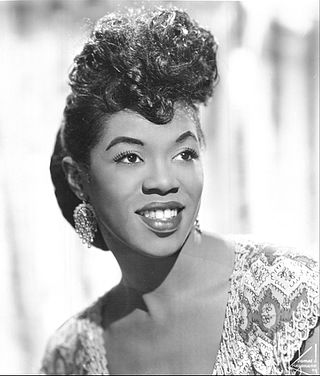
The singles discography of American Jazz artist Sarah Vaughan contains 89 singles, two promotional singles and seven other charted songs. Vaughan recorded her first singles in 1946, with her first release being "If You Could See Me Now". Soon after, she saw her first major chart success on the Billboard pop list with "Tenderly" and "It's Magic." Moving to Columbia Records, she had further pop hits in the late 1940s with covers of "Black Coffee" and "Nature Boy." She had her second top ten hit in 1950 with "(I Love the Girl) I Love the Guy." Vaughan moved to Mercury Records during the 1950s and recorded more pop music. At Mercury, she had her biggest chart success, with the top ten hits "Make Yourself Comfortable" and "Whatever Lola Wants." In 1959, Vaughan's single "Broken Hearted Melody" reached number seven on the Billboard pop chart and became an international success, becoming the biggest single of her career.

